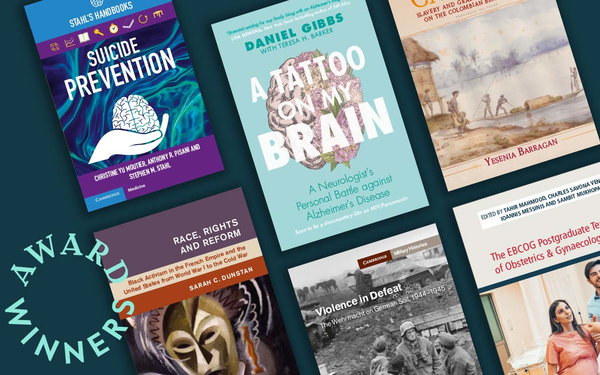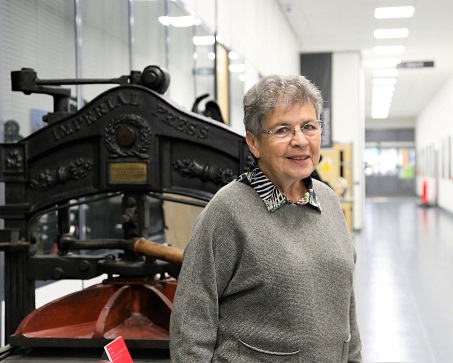News and Events
Award winners: top class scholarly works of 2022
It has been another outstanding year for our publishing, with Cambridge books and authors winning awards and plaudits.

A remarkable 46 of our books have just been named as Outstanding Academic Titles in the Choice Awards, the American Library Association’s (ALA) prestigious annual list.
It is one of the most impressive showings for Cambridge titles on the list, which is selected from the thousands reviewed by the ALA’s Choice magazine during the previous 12 months.
Outstanding Academic Titles are chosen for their excellence in scholarship and presentation, the significance of their contribution to the field, their originality and value as an essential treatment of their subject, and significance in building undergraduate collections.
This year’s crop of Cambridge titles includes:
A monumental piece of scholarship and lexicography and the most innovative new dictionary of Ancient Greek in almost 200 years. The result of 23 years’ work by a team from the Faculty of Classics at the University of Cambridge, led by Editor-in-Chief, Professor James Diggle, the dictionary provides fresh definitions and translations gleaned from the Herculean task of re-reading most of Ancient Greek literature.
Dr Daniel Gibbs is one of 50 million people worldwide with an Alzheimer's disease diagnosis. Unlike most patients with Alzheimer's, however, Dr Gibbs worked as a neurologist for twenty-five years, caring for patients with the very disease now affecting him. Also unusual is that Dr Gibbs had begun to suspect he had Alzheimer's several years before any official diagnosis could be made. Forewarned by genetic testing showing he carried alleles that increased the risk of developing the disease, he noticed symptoms of mild cognitive impairment long before any tests would have alerted him. In this highly personal account, Dr Gibbs documents the effect his diagnosis has had on his life and explains his advocacy for improving early recognition of Alzheimer's. Weaving clinical knowledge from decades caring for dementia patients with his personal experience of the disease, this is an optimistic tale of one man's journey with early-stage Alzheimer's disease.
Are we now entering a mass extinction event? What can mass extinctions in Earth's history tell us about the Anthropocene? What do mass extinction events look like and how does life on Earth recover from them? The fossil record reveals periods when biodiversity exploded, and short intervals when much of life was wiped out in mass extinction events. In comparison with these ancient events, today's biotic crisis hasn't (yet) reached the level of extinction to be called a mass extinction. But we are certainly in crisis, and current parallels with ancient mass extinction events are profound and deeply worrying. Humanity's actions are applying the same sorts of pressures - on similar scales - that in the past pushed the Earth system out of equilibrium and triggered mass extinction events. Analysis of the fossil record suggests that we still have some time to avert this disaster: but we must act now.
Each year, Cambridge University Press & Assessment is proud to receive a range of awards and prizes in the worlds of academia and educational publishing. In recent weeks, many Cambridge titles have featured in Books of the Year lists produced by media including the Financial Times, Telegraph, Times Literary Supplement, Wall Street Journal and BBC History Magazine, while several others were recently recognised by the British Medical Association (BMA) and by the American Historical Association awards.
Winners at the BMA Medical Book Awards, which recognise outstanding contributions to medical literature, were:
The current suicide public health crisis and advances in clinical practice have increased the need for clear, evidence-informed guidance on suicide prevention in healthcare. This clinical suicide prevention handbook is an essential resource for mental health and primary care professionals, and any practitioner aiming to ensure their practice is up-to-date, patient-centred and consistent with the most current standards of care. Starting with a summary of the science and public health model of suicide, the book offers quick tips for suicide screening, risk assessment, interventions, and follow-up communication. It discusses medicolegal risk management, how health systems can prevent suicide and provides highly specialized guidance for clinicians following the loss of a patient to suicide. Focused sections include incorporating social media into care plans, telemedicine, issues related to culture and race/ethnicity, and working with specific populations. It introduces an integrated, prevention-oriented approach to suicide prevention, incorporating realistic supports, foreseeable changes, and strategies.
This authoritative textbook provides a much-needed guide for postgraduate trainees preparing for the European Board and College of Obstetrics and Gynaecology (EBCOG) Fellowship examination. Published in association with EBCOG, it fully addresses the competencies defined by the EBCOG curriculum and builds the clinical practice related to these competencies upon the basic science foundations. Volume 2 covers the depth and breadth of gynaecology, and draws on the specialist knowledge of four highly experienced Editors and over 100 contributors from across Europe, reflecting the high-quality training needed to ensure the safety and quality of healthcare for women. It incorporates key international guidelines throughout, along with colour diagrams and photographs for easy understanding. This is an invaluable resource, not only for postgraduate trainees planning to sit the EFOG examination, but also for practising specialists looking to update their knowledge and skills to meet the ever-evolving complexity of clinical practice.
Our winning titles at the American Historical Association awards included:
In the final year of the Second World War, as bitter defensive fighting moved to German soil, a wave of intra-ethnic violence engulfed the country. Bastiaan Willems offers the first study into the impact and behaviour of the Wehrmacht on its own territory, focusing on the German units fighting in East Prussia and its capital Königsberg. He shows that the Wehrmacht's retreat into Germany, after three years of brutal fighting on the Eastern Front, contributed significantly to the spike of violence which occurred throughout the country immediately prior to defeat. Soldiers arriving with an ingrained barbarised mindset, developed on the Eastern Front, shaped the immediate environment of the area of operations, and of Nazi Germany as a whole. Willems establishes how the norms of the Wehrmacht as a retreating army impacted behavioural patterns on the home front, arguing that its presence increased the propensity to carry out violence in Germany.
Sarah C. Dunstan constructs a narrative of black struggles for rights and citizenship that spans most of the twentieth century, encompassing a wide range of people and movements from France and the United States, the French Caribbean and African colonies. She explores how black scholars and activists grappled with the connections between culture, race and citizenship and access to rights, mapping African American and Francophone black intellectual collaborations from the Paris Peace Conference in 1919 to the March on Washington in 1963. Connecting the independent archives of black activist organizations within America and France with those of international institutions such as the League of Nations, the United Nations and the Comintern, Dunstan situates key black intellectuals in a transnational framework. She reveals how questions of race and nation intersected across national and imperial borders and illuminates the ways in which black intellectuals simultaneously constituted and reconfigured notions of Western civilization.
Freedom's Captives is a compelling exploration of the gradual abolition of slavery in the majority-black Pacific coast of Colombia, the largest area in the Americas inhabited primarily by people of African descent. From the autonomous rainforests and gold mines of the Colombian Black Pacific, Yesenia Barragan rethinks the nineteenth-century project of emancipation by arguing that the liberal freedom generated through gradual emancipation constituted a modern mode of racial governance that birthed new forms of social domination, while temporarily instituting de facto slavery. Although gradual emancipation was ostensibly designed to destroy slavery, she argues that slaveholders in Colombia came to have an even greater stake in it. Using narrative and storytelling to map the worlds of Free Womb children, enslaved women miners, free black boatmen, and white abolitionists in the Andean highlands, Freedom's Captives insightfully reveals how the Atlantic World processes of gradual emancipation and post-slavery rule unfolded in Colombia.
There was recognition too for bestselling Cambridge author, Penny Ur OBE in November, when she won the Outstanding Achievement award at this year’s ELTons, the British Council awards that celebrate those who have found new and innovative ways of helping English language learners and teachers around the world.

Penny received the award for her unique contribution to the field, in a career that has spanned five decades.
Karen Momber, Senior Professional Learning & Development Consultant at Cambridge University Press & Assessment, said: “Penny is highly regarded throughout the whole English language teaching sector and she thoroughly deserves the award.
"She has only ever published with Cambridge and we’ve been working with her since the early 1980s.This makes her a big part of the Cambridge family and her ground-breaking books have had a huge impact on teachers and learners all over the world.”
The full list of Cambridge books on the ALA’s Choice list of outstanding academic titles:
- A History of African American autobiography
- A History of American literature and culture of the First World War
- A History of Chilean literature
- A History of world Egyptology
- A tattoo on my brain: a neurologist’s personal battle against Alzheimer’s disease
- An urban history of China
- Asian American literature in transition
- Bionanotechnology: concepts and applications
- Chairman Mao’s children: generation and the politics of memory in China
- Consumer genetic technologies: ethical and legal considerations
- Cuban privilege: the making of immigrant inequality in America
- Drought, flood, fire: how climate change contributes to catastrophes
- Dyslexia in higher education: anxiety and coping skills
- Economics for a fragile planet: rethinking markets, institutions and governance
- Effective governance under anarchy: institutions, legitimacy, and social trust in areas of limited statehood
- Extinctions: living and dying in the margin of error
- Flooding and management of large fluvial lowlands: a global environ
- Frederick Douglass in context
- Fuelling Mexico: energy and environment, 1850–1950
- Gender and Christian ethics
- Healing knowledge in Atlantic Africa: medical encounters, 1500–1850
- Ibsen in context
- Imperial science: cable telegraphy and electrical physics in the Victorian British empire
- Kant’s critique of taste: the feeling of life
- Knowing women: same-sex intimacy, gender, and identity in postcolonial Ghana
- Lactation at work: expressed milk, expressing beliefs, and the expressive value of law
- Leading with values: strategies for making ethical decisions in business and life
- Modernity in black and white: art and image, race and identity in Brazil, 1890–1945
- Much like us: what science reveals about the thoughts, feelings, and behaviour of animals
- Mussolini’s theatre: Fascist experiments in art and politics
- Nobel life: conversations with 24 Nobel laureates on their life stories, advice for future generations and what remains to be discovered
- Nomads in the Middle East
- On the offensive: prejudice in language past and present
- Only in Africa: the ecology of human evolution
- Our plastic problem and how to solve it
- Radioecology: sources and consequences of ionising radiation in the environment
- Reflections from pioneering women in psychology
- Revolutionary world: global upheaval in the modern age
- Shakespeare in print: a history and chronology of Shakespeare publishing
- Shari’a, inshallah: finding god in Somali legal politics
- State and family in China: filial piety and its modern reform
- Succession to the throne in early modern Russia: the transfer of power 1450–1725
- The Cambridge companion to early American literature
- The Cambridge companion to Sappho
- The Cambridge Greek lexicon
- The Cambridge handbook of animal cognition
You can browse the full range of our scholarly titles by visiting www.cambridge.org/academic





